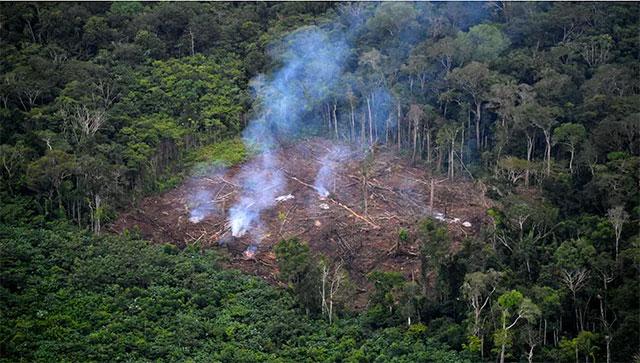- International News
- Friday-2021-02-19 | 02:59 pm

Nayrouz News Agency :
Climate change, biodiversity loss and pollution pose a triple threat to human health and prosperity that may be averted only by transforming how we power our economies and feed ourselves, the United Nations said on Thursday.
A scientific assessment by the UN Environment Programme found that galloping economic growth has come at a devastating cost to the planet and urged governments, businesses and people around the world to act to reverse the damage before it is too late.
Drawing on findings from other major assessments on climate and biodiversity from expert international panels, the report titled "Making Peace With Nature" said a rapid shift to renewable energy and eliminating habitat loss are essential to preventing "unacceptable risk" for future generations.
"For too long, we have been waging a senseless and suicidal war on nature," said UN Secretary General Antonio Guterres.
"The result is three interlinked environmental crises: Climate disruption, biodiversity loss and pollution threaten our viability as a species."
Lead report author Robert Watson told AFP that the three crises threatened far more than nature.
"They undermine food security, water security and human health," he said.
The report found that the global economy had grown nearly fivefold in the last 50 years fuelled by a tripling in extraction of natural resources and energy.
Yet, amid such prolific growth, the burden of the environmental fallout is borne by the poorest and most vulnerable, it said.
Although average prosperity has doubled over the last five decades, around 1.3 billion people are classed as poor and 700 million go to bed hungry each night.
The assessment said that environmental degradation was undermining progress on ending poverty and hunger and warned that pandemics such as Covid-19 were increasingly likely in future as we continue to strip away species' natural habitats.
"This is not the first pandemic caused by animal to human infection, so we really have to think how we can prevent the next one," said Watson, a veteran climate and biodiversity researcher.
"By cutting down vegetation, we humans go into areas we didn't used to go into and therefore we interact with wild animals."
'Low-hanging fruit'
Despite a record drop in emissions last year as the pandemic curbed international travel, the world is on track to be at least 3℃ above pre-industrial levels by 2100.
That is a far cry from the aims of the Paris climate deal, in which nations promised to limit warming to "well below" 2℃ and to a safer cap of 1,5 ℃ if possible.
None of the goals the world set itself a decade ago for halting nature loss has been met, with one million species of plants and animals currently threatened with extinction.
The assessment recommended that protected areas be expanded to allow for more space for wild species, as well as addressing the drivers of forest loss, such as unsustainable farming and food waste.
It also found that governments pay out a staggering $5-7 trillion in subsidies to fossil fuel and large-scale farming operations.
These contribute to air pollution that kills an estimated 8 million people each year.
Co-author Ivar Baste said that reducing fossil fuel subsidies -- which after all most benefit richer, high-polluting firms -- should be considered "low-hanging fruit" in the fight against climate change.
"We have to do the obvious," he told AFP, while noting that "vested interests" are pushing for continued fossil fuel use.
With 2021 set to see two major UN summits on biodiversity loss and climate change, the authors said "piecemeal and uncoordinated" responses would fall well short of what the planet needs.
"While I applaud all the countries in the world that have set zero net carbon dioxide emissions by 2030, the real issue is what will countries do between now and 2030," Watson said.
"Action really is needed in the short term, not just aspirational goals for the middle of the century."













